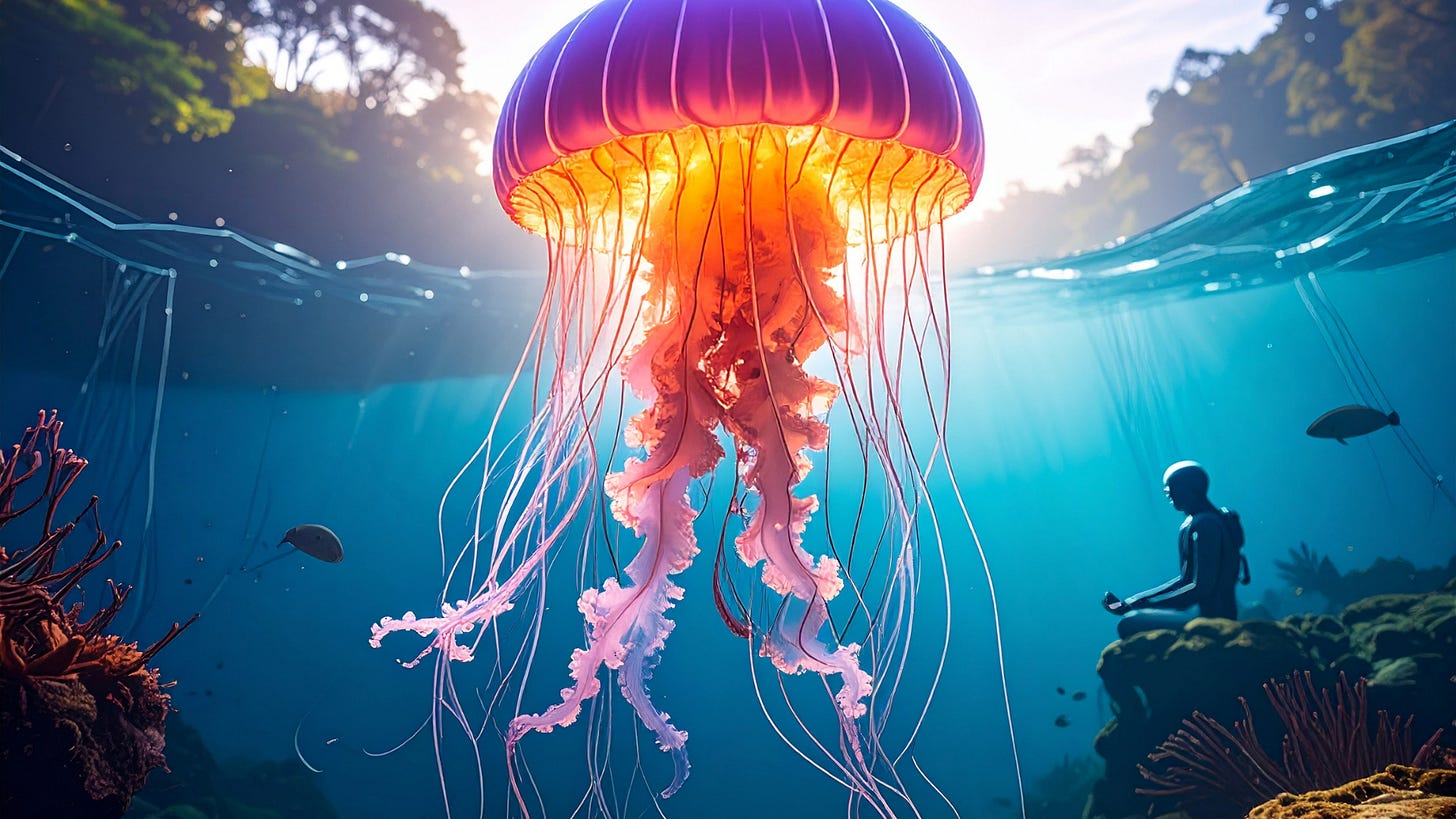A Response to Dario Amodei's "Machines of Loving Grace"
Earth to AI: We're All in This Together (Yes, Even the Jellyfish)
In his thoughtful essay "Machines of Loving Grace," Dario Amodei presents a compelling vision of how powerful AI might transform our world for the better. His focus on biology, neuroscience, economic development, peace, and meaning paints a picture of a future where humanity's most pressing challenges might be addressed through technological advancement. I find myself deeply moved by this vision, yet also sensing an opportunity to expand our perspective beyond the predominantly human-centered approach.
Brautigan's Double Vision
When Richard Brautigan penned his iconic poem "All Watched Over by Machines of Loving Grace" in 1967 as poet-in-residence at Caltech, he imagined "a cybernetic ecology" where humans would be "free of our labors and joined back to nature, returned to our mammal brothers and sisters." This vision wasn't merely about liberation from toil, but about reconnection with the broader web of life. There's a poignant tension in Brautigan's poem—both a yearning for technological harmony and an implicit acknowledgment of our separation from nature.
Brautigan's cybernetic meadow wasn't just about machines serving human needs, but about a deeper synthesis: "mammals and computers live together in mutually programming harmony." This mutual relationship—not a hierarchy—suggests an ecological perspective where all entities, biological and technological, exist in relationship with one another.
From Ego to Eco Intelligence
The distinction between ego-centered and eco-centered worldviews offers a valuable lens for considering AI's development. An ego-centered approach prioritizes:
Human needs above all other considerations
Technological solutions to human problems
Progress measured primarily by human flourishing
Control and management of nature
In contrast, an eco-centered approach recognizes:
The intrinsic value of all life forms and ecosystems
Humans as participants in, not masters of, complex natural systems
Success measured by the health of entire ecosystems
Technologies designed to support regenerative relationships
Amodei's vision is deeply humanitarian and genuinely inspiring. His focus on curing disease, alleviating poverty, and improving governance would undoubtedly reduce immense suffering. However, expanding this vision to encompass an ecological perspective could help ensure that our technological future doesn't solve human problems while exacerbating ecological ones.
Expanding the Circle of Moral Consideration
In Amodei's essay, the focus remains predominantly on human welfare, with nature and other species appearing primarily as instruments for human benefit. Yet a truly transformative vision might expand the circle of moral consideration to recognize the inherent worth of all beings with whom we share this planet.
What if powerful AI were directed not only toward addressing human suffering but also toward:
Ecological restoration: Developing approaches to regenerate damaged ecosystems and reverse biodiversity loss, with respect for nature's inherent complexity rather than simply as carbon sinks or human resources.
Interspecies understanding: Creating tools that help us understand and communicate with other species, recognizing their unique forms of intelligence and experience.
Climate justice: Addressing climate change not just as a human crisis but as one affecting all species, with solutions that respect all life forms.
Holistic well-being: Measuring success not just by human health metrics but by the health of entire ecosystems, watersheds, and planetary systems.
AI Guided by Ecological Wisdom
To be clear, this is not a critique of Amodei's vision but rather an invitation to expand it. The greatest challenges we face—climate change, biodiversity loss, resource depletion—stem not from lack of technical solutions but from fragmented worldviews that treat human welfare as separate from ecological health.
What might AI development look like if guided by ecological wisdom? Perhaps:
Training data would include indigenous knowledge systems that emphasize reciprocal relationships with nature
Development would be informed by systems thinking that recognizes complex interdependencies
Success metrics would include not just human outcomes but ecological ones
Safety research would consider impacts on all beings, not just humans
A Both/And Future
The choice isn't between human welfare and ecological health—they are inseparable. The most profound promise of AI may be helping us bridge the artificial separation between humanity and nature that has characterized much of modern technological development.
In an eco-intelligent future, AI systems might help us recognize that our own flourishing is intimately tied to the well-being of all life. They might help us design economic and social systems that align human interests with ecological ones. They might help us understand ourselves as part of—not apart from—the living systems that sustain us.
Brautigan's poem ends with the image of machines watching over us with "loving grace." Perhaps the most graceful future is one where AI helps humanity recognize itself as one remarkable strand in the intricate web of life—where machines serve not just human masters, but the miraculous, interconnected dance of all existence.
By embracing this expanded vision, Anthropic and other AI developers have an extraordinary opportunity to help humanity transition from an ego-centric to an eco-centric relationship with technology, each other, and the more-than-human world that has always been our true home.
#AIEthics #EcologicalAI #MoreThanHuman #AIForEarth #EcoIntelligence #RegenerativeAI #AllSpeciesMatter





Beautifully stated! This brings to mind Einstein's directive to widen our circles of compassion.